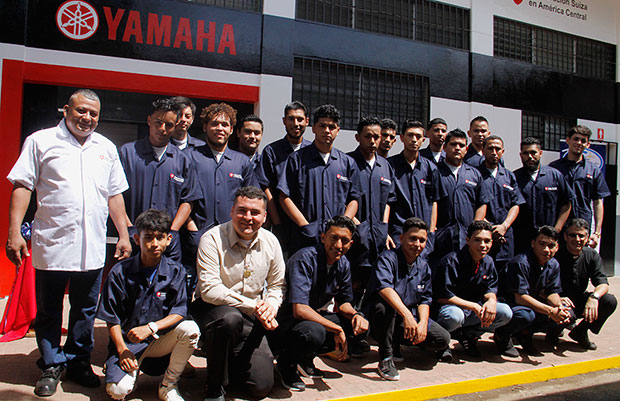
Fixing for a Brighter Future in Nicaragua
With approximately 30 percent of the population, or 1.7 million people, living below the official poverty line, Nicaragua is one of the poorest countries in Latin America. While the reasons are many and complex, the number of high school dropouts—up to 44 percent in the first few years alone—is especially concerning. Today, thanks to a new partnership between the Don Bosco Youth Center in Managua and the nationally known motorcycle rental and resale company Casa Pellas, at-risk youth have additional opportunities to learn in-demand job skills and turn their lives around.
“So many of the students who drop out come from economically disadvantaged families,” explains Father Mark Hyde, director of Salesian Missions. “Considering that decent job opportunities remain scarce in Nicaragua, and that the cost of educating their children can be prohibitive, these families simply don’t see the value in continuing to send them to school. This unfortunately contributes to an ongoing cycle of generational poverty that can be impossible to break.”
In response to these trends, Salesian missionaries throughout the country are planning to update ten technical training programs to better reflect existing market demands and strengthen relationships with local employers. These efforts were designed to help reduce poverty and encourage development in education, skills and job outcomes among youth.
The “Pbro Salvador Cafarelli SDB Motorcycle Maintenance and Repair Laboratory-School” in Managua represents their first success. This school, with technical assistance from Yamaha, offers a certificate program which prepares students to repair and maintain an important means of transportation in their country—either as employees of an existing business like Casa Pellas, or as individual entrepreneurs. Scholarships are available to cover up to 90 percent of students’ tuition.
In order to guarantee the highest quality training possible, Casa Pellas has generously donated state-of-the-art tools and materials. The company is also paying to send teachers to Japan, where they will update their own technical knowledge directly from Yamaha.
“This helps guarantee that their students will graduate with the latest, highly sought-after skills,” says Fr. Mark.
Students will also have the opportunity to complete a free online motorcycle safety course. When successfully completed, they will also qualify as certified road safety professionals—a credential that further boosts their future earning potential.
Speaking of the future: it indeed looks much brighter for youth in Managua, and across the country, thanks to opportunities like these.
Our mission helps youth learn marketable skills to provide for themselves and their families. What’s your mission?
Learn more about our work in Nicaragua.

